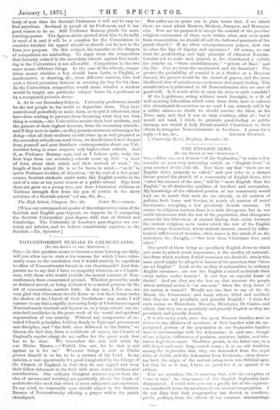NONCONFORMIST BURIALS IN CHURCHYARDS. ire THE EDITOR OF THE "SPECTATOR.")
.SIR,—As this question seems to become a more burning one daily, will you allow me to state a few reasons for which I have reluc- tantly come to the conclusion that it would scarcely be expedient to allow of Nonconformist burials in our churchyards? And first, permit me to say that I have no sympathy whatever, as a Church- -man, with those who would exclude the mortal remains of Non- conformists from consecrated ground. Whether ground be made or declared sacred, as being dedicated to a sacred purpose by the act of consecration, matters little. In any case, I, for one, am -very glad that Dissenters should desire to rest their bones under the shadow of the Church of their forefathers ; nay, more, I will -venture to say that a rapidly increasing body of Churchmen regard Nonconformist teacheM and laymen as, to a large extent, our un- attached auxiliaries in the great work of the moral and spiritual regeneration of our country. Without any compromise of so- called Church principles, bolding firmly to Episcopal government and discipline, and " the faith once delivered to the Saints," we fliscern the fact that, from a multitude of causes, the Church of England's regular clergy do not suffice for the great work that has to be done. We remember the rule laid down by our Divine Master,—" Forbid him not, for he that is not against us is for us." Whoever brings a soul to Christ proves himself in so far to be a servant of his Lord. In my opinion, a vast opportunity for good is neglected by the Clergy of the Church of England, in that they do not regard and treat their fellow-labourers in the field with more active kindness and consideration. Our ordinary liturgical services (apart from the idea of sacramental worship) are practically above the heads of multitudes who need that which is more subjective and emotional. To my mind, no reasonable man should object to the Baldwin Browns of Nonconformity offering a prayer within the parish churchyard.
But suffer me to point out in plain terms that, if we admit these, we must admit Ranters, Shakers, Jumpers, and Mormons also. Now are we prepared to accept the scandal of the peculiar religious ceremonies of these sects within what, and even apart from consecration, we should all call the hallowed precincts of the parish church ? If we allow extemporaneous prayer, how can we close the lips of bigotry and ignorance? Of course, we can trust the good-feeling and high principle of educated Noncon- formists not to make such prayers in the churchyard a vehicle for attacks on " State establishments," " priests of Baal," and the like. Can we trust the uneducated and the fanatical ? The greater the probability of scandal is at a Shaker or a Mormon funeral, the greater would be the crowd of gapers, and the more likelihood also of mischievous excitement and angry feeling. This consideration is:addressed to all Nonconformists who are men of good-will. Is it worth while to open the door to such scandals ?
If the Legislature, acting without much foresight, in a fit of well-meaning Liberalism which costs them little, were to enforce this churchyard-desecration on us—and I can scarcely call it by a milder name—no doubt we should survive the blow, as the Times says, and find it not so very crushing, after all ; but it would not tend, I think, to promote good-feeling or public decency, nor would it help liberal-minded Churchmen in their Aorta to recognise Nonconformists as brethren. I pause for a










































 Previous page
Previous page